Share
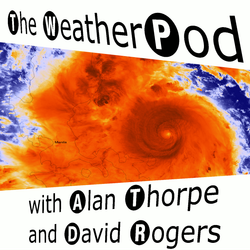
The WeatherPod
Public, private and academic sectors working together to address the challenges & opportunities of extreme weather & climate change
Latest episode

AI Special, Episode 6: Using AI to improve weather information
50:25|In this episode of The WeatherPod hosts David Rogers and Alan Thorpe invited Shruti Nath of Oxford University into the studio.Shruti’s research is about using data-driven, Artificial Intelligence or AI techniques for improving weather forecasts - and rainfall forecasts in particular. The emphasis of her work is very much on linking research to action. A key part of this is collaboration with local meteorological departments in the Greater Horn of Africa on the development of operational AI-based post-processing techniques. Our discussion was wide ranging and shed much new light on the potential value of AI in weather forecasting.The areas we covered ranged from from the pros and cons of using AI-based post-processing techniques for raw weather data, to AI’s potential role in generating much larger ensembles than are currently possible.We examined the massive step change cloud computing could bring to local forecasting capabilities by enabling weather services in developing countries to train and develop their own AI models.We also looked at the influence AI could have in coming years on the way weather information is used by weather affected end users. Finally, we took a gaze into the future. How did Shruti think the global weather enterprise might evolve in future years in the light of the emerging AI tools she’s been working with?
More episodes
View all episodes
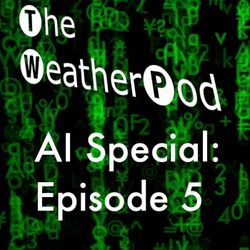
5. AI Special, Episode 5: AI transformation at Met Éireann
43:23||Ep. 5The growing use of Artificial Intelligence in the field of weather prediction and forecasting is likely to have profound implications for national meteorological services in the coming years.In this fifth episode in our special WeatherPod series on AI, we've invited Dr. Alan Hally into the studio to examine how one met service - Met Éireann - is approaching the use of AI in its operations.Alan is the Scientific Lead in Met Éireann's recently formed AI Transformation Team. This team's primary aim is to optimise the services Met Éireann provides to Irish citizens through the targeted application of AI or machine learning technologies.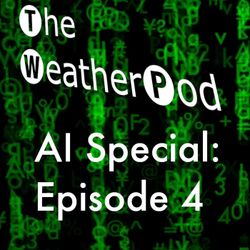
4. AI Special Episode 4: Digital Twins of Planet Earth
50:43||Season 1, Ep. 4In this episode of The WeatherPod, hosts Alan Thorpe and David Rogers invite Irina Sandu, the Director of Destination Earth at the European Centre for Medium-Range Weather Forecasts - the ECMWF - into the studio.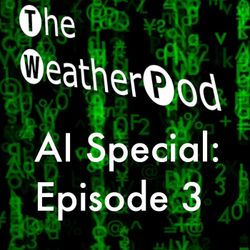
AI Special Episode 3: ECMWF's strategy for using AI predictions
01:00:16|The guest this episode is Florian Pappenberger, Deputy-Director General & Director of Forecasts at the European Centre for Medium-Range Weather Forecasts, the ECMWF.Hosts David Rogers and Alan Thorpe delve into the ECMWF's use of AI and how this may impact it's future products and services, especially when it comes to their use in the developing countries by meteorological services and other customers.Florian leads the ECMWF's Forecast Department which is responsible for the production of weather forecasts, forecast quality control, and the development of novel forecast products.ECMWF has for a while been experimenting with using deep learning to produce a data-based AI weather prediction model and last October Florian played a key role in the launch of the Artificial Intelligence / Integrated Forecasting System. This is the ECMWF's first forecasting system incorporating a machine learning prediction module.
2. AI Special Episode 2: Trustworthy Artificial Intelligence
51:59||Season 1, Ep. 2In this special AI Episode, hosts Alan Thorpe and David Rogers invite Amy McGovern into the studio to discuss the meaning of "trustworthy AI".Amy is Director of the National Science Foundation AI Institute for Research on Trustworthy AI in Weather, Climate, and Coastal Oceanography - or AI2ES for short.She's also a Professor at Oklahoma University's School of Computer Science and School of Meteorology.Working under the University of Oklahoma's leadership, AI2ES brings together researchers in AI, atmospheric science, ocean science, and risk communication. The thinking is that accelerated AI research in the environmental sciences can improve understanding of the rapid changes taking place in weather patterns, oceans, sea level rise, and disaster risk. Amy's research focuses on developing and applying machine learning and data mining methods for real-world applications, with a specific interest in high-impact weather. Much of this work involves weather analytics or physical data science and she and her students are developing physics-based trustworthy AI methods as well as explainable AI. Their aim is to apply their work to high-impact weather phenomena, including tornadoes, hail, severe wind events, flooding, drought, and aircraft turbulence.A key aim is to help build a diverse and flexible science, technology, engineering, and mathematics workforce. Amy's thinking is that diversity will bring new ideas to the forefront, while flexibility is crucial to dealing with rapid changes in technology. To help this process, Amy and her team have developed outreach projects to encourage students to pursue STEM careers.This work aside, Amy also directs the Interaction, Discovery, Exploration and Adaptation - or IDEA - Lab at Oklahoma University. The Lab's focus is on developing and applying data science, AI and machine learning techniques for high-impact real-world applications.
27. Episode 27: A Global Interactive Forecasting System
56:46||Season 1, Ep. 27In this episode of The WeatherPod, hosts Alan Thorpe and David Rogers invite David Richardson of the European Centre for Medium-Range Weather Forecasts - the ECMWF - into the studio.About David RichardsonDavid Richardson has over 35 years’ experience in weather forecasting research and operations at the UK Met Office and, until recently, as Head of Evaluation at the European Centre for Medium-Range Weather Forecasts or ECMWF. His work on ensemble prediction includes the configuration of ensembles to represent the uncertainties in the initial conditions and modelling systems, development of products and tools for forecast users, and evaluation of forecast performance. Previously, he worked for the WMO where he played a key role in establishing the THORPEX Interactive Grand Global Ensemble or TIGGE project on global ensemble forecasting - a project which led to improved understanding of predictability and also to improvements in forecasting skill. David has chaired several WMO committees, and is currently chair of the WMO Standing Committee on Data Processing for Applied Earth System Modelling, Prediction & Projection (SC-ESMP). SC-ESMP leads and co-ordinates the WMO Integrated Processing and Prediction System (WIPPS) which facilitates the provision of numerical earth-system model forecasts, including ensembles, to all WMO members.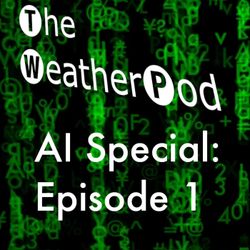
1. AI Special Episode 1: Using AI for weather forecasting
48:40||Season 1, Ep. 1In this special AI episode of The WeatherPod, hosts Alan Thorpe and David Rogers open a new series of discussions which focus specifically on the use of Artificial Intelligence across the weather enterprise.In this first discussion, our hosts invite Professor Kirstine Dale of the UK Met Office into the studio.About Kirstine DaleKirstine Dale is the Met Office's Chief AI Officer (CAIO) and Principal Fellow for Data Science. As CAIO she is charged with embedding AI in the Met Office’s core business - initially focusing on the use of AI in weather forecasting through leadership of the ‘AI for Numerical Weather Prediction’ (AI4NWP) programme. As Principal Fellow, Kirstine plays a leading role in shaping the future of Data Science (including Artificial Intelligence and Machine Learning) in the Met Office. Kirstine is also Co-Director of the Natural Environment Theme of the Turing Research and Innovation Cluster on Digital Twins (TRIC-DT) and an Honorary Professor at the University of Exeter.